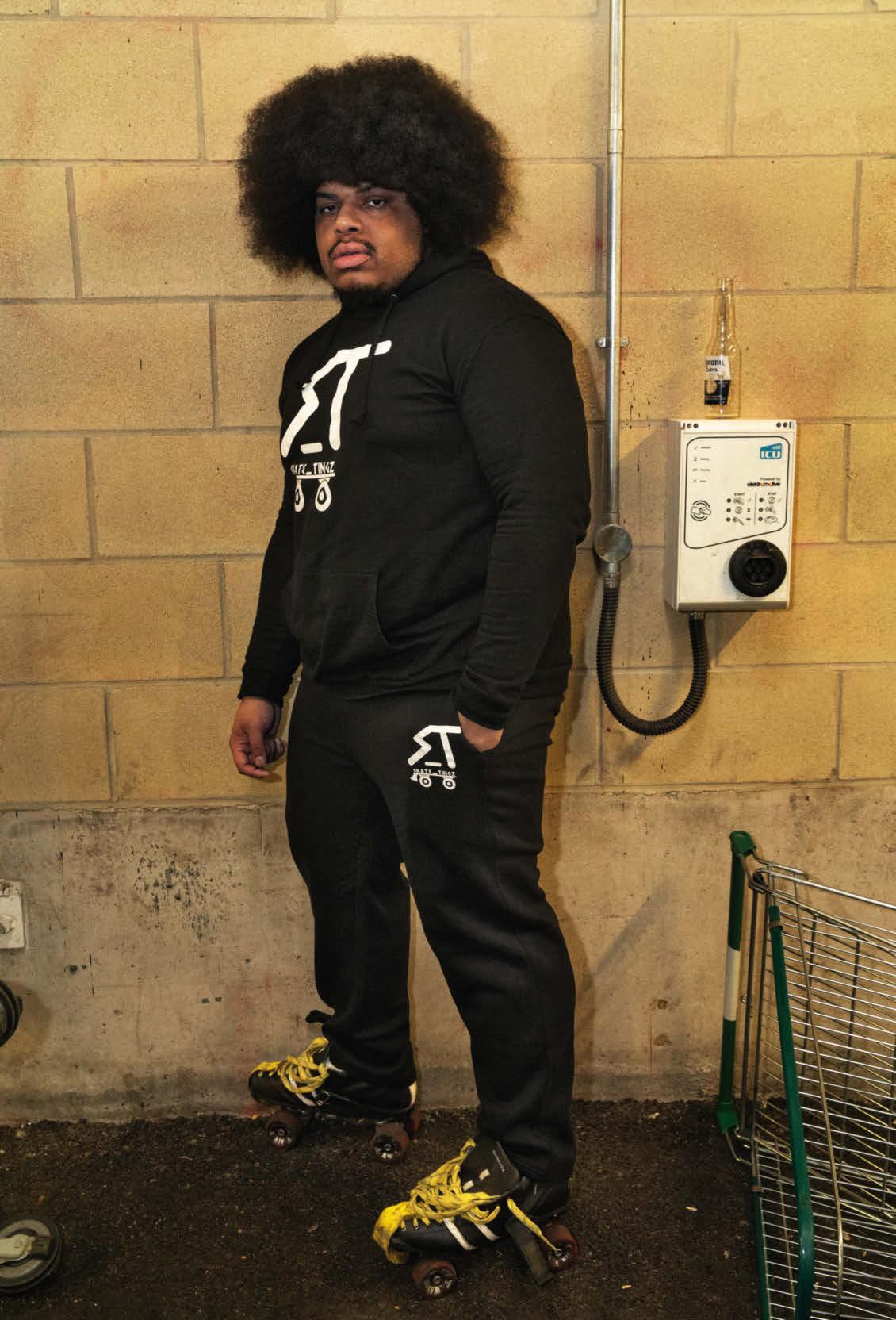
13 minute read
Tom Pidcock
Kurt Bogaerts
tour. Baby-faced and exuding youth, he nonetheless wears a shadow of exertion behind the smile, born of almost two decades’ riding, 11 of them racing.
Those years and miles have brought results, raised his profile, and taken him to the brink of the big time. Highlights include a dominant victory on last year’s under-23 Giro d’Italia and two age-grade world titles in cyclocross – the muddier, more intense cousin of road racing. Myriad other wins in both disciplines, as well as in mountain biking – including E-MTB world champion status – and track cycling, litter Pidcock’s CV like gold and silver confetti.
What’s next is tantalising. “I’m super-excited,” he says, talking with sudden animation at the prospect of a 2021 season that includes elite-level mountainbike competition and perhaps racing the Vuelta a España – the Spanish equivalent of the Tour de France – for INEOS Grenadiers. “I haven’t been so excited about anything for a while.”
Few riders reach the point of being signed by probably the best team on the pro tour – formerly Team Sky, home of British Tour de France giants Bradley Wiggins, Chris Froome and Geraint Thomas – while still being spoken of as a shining light in ’cross and a future Olympian in cross-country mountain biking. In years past, a rider would have been expected to specialise in a given discipline by the time he or she turned pro, and then to have found their groove as a climber, a sprinter, or a one-day ‘Classics’ ace.
Pidcock, though, has options, somewhat in the mould of the Netherlands’ Mathieu van der Poel or Belgium’s Wout van Aert, both stellar road talents in their twenties, who are also winning at the highest level of off-road competition.
There’s no hint of the Brit being awed by the scale of the challenge, nor of being overshadowed by the eminence of Grand Tour winners in his team such as Geraint Thomas and Egan Bernal. Pidcock just feels ready: “It’s been the long game, so I’ve been anticipating it for a while. A lot of other young guys are doing so well [he name-checks Van der Poel, Van Aert and France’s Julian Alaphilippe], so it’s quite normal nowadays. People say I’m a good rider, but waiting till I’m 21 [to race as a senior pro] is almost a long time now. In all honesty, it doesn’t seem like I’ve come far so quickly.”
Even the prospect of a three-week Grand Tour reckoned by some to be tougher, though less glitzy, than the Tour de France doesn’t faze Pidcock. “The biggest thing for a Grand Tour is not straight-up preparing for it,” he says. “It’s more like being in full training mode. When you can see the progression and you can see your body working efficiently… that’s what you need. If I’m in that state, I don’t think there’s a problem. I recover very quickly. Obviously it’s a long time, but if I do everything right I think I can perform for three weeks.”
Such a matter-of-fact approach is not uncommon in elite competitors; their confidence is a function of repeat success layered on profound self-belief. But in Pidcock’s case there may be something more. “He could be a unique rider who does something that has never been done – possibly even a kind of cyclist we have never seen before,” says Kurt Bogaerts, Pidcock’s coach for the past three years at the Trinity Racing team that was built to further his junior career. “He has such high ability, he’s so diverse. In the proper environment, he’s right to have big dreams.”
Bogaerts is a widely respected coach and pro- team directeur sportif, who has lent his expertise to legends such as Ireland’s Sean Kelly, as well as latter-day hotshots like sprinter Sam Bennett. “He [Pidcock] is a cyclist of the new generation – very good at a young age,” says Bogaerts. “What makes Tom so good is that he’s an athlete – more of an athlete than a bike rider. He can run really well. He can ride well in any discipline. If you go skiing with him, he’s a good skier, too. He clearly has good genetics, and on top of that he can handle workload. He has a good lifestyle naturally, so what’s difficult for some is quite normal for him.”
Pidcock’s response to this kind of acclaim is simply to refer back to a childhood spent on a bike, including riding to and from school every day. “Riding a bike is like a third arm,” he says. “It comes naturally. That makes it easier to go between disciplines, I think. It’s about riding the bike fast and not so much about technical aspects. It’s just what I do.”
Steep task: Pidcock, Van der Poel and Van Aert out of the saddle and climbing at the Cyclocross World Cup, December 2020
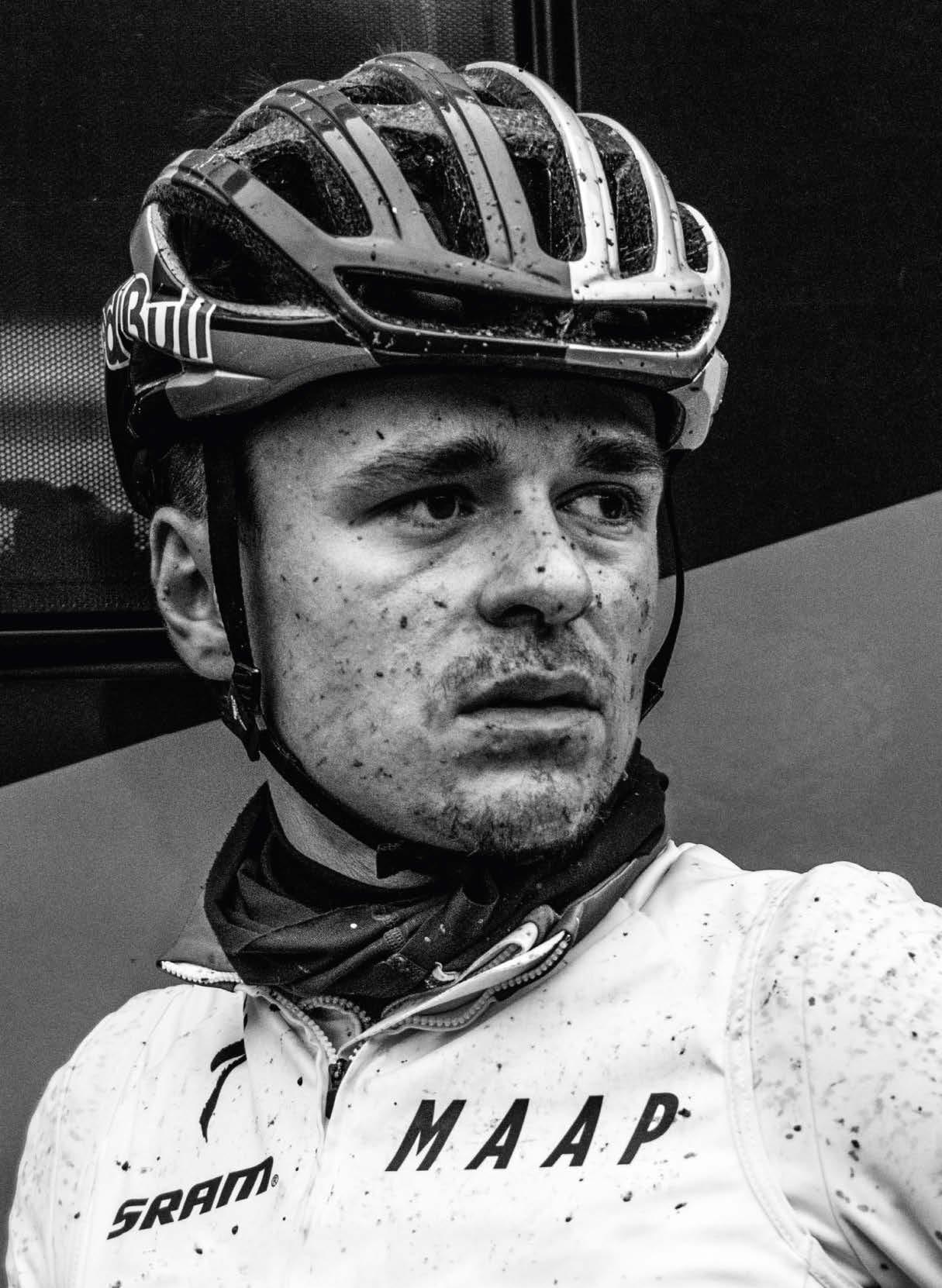
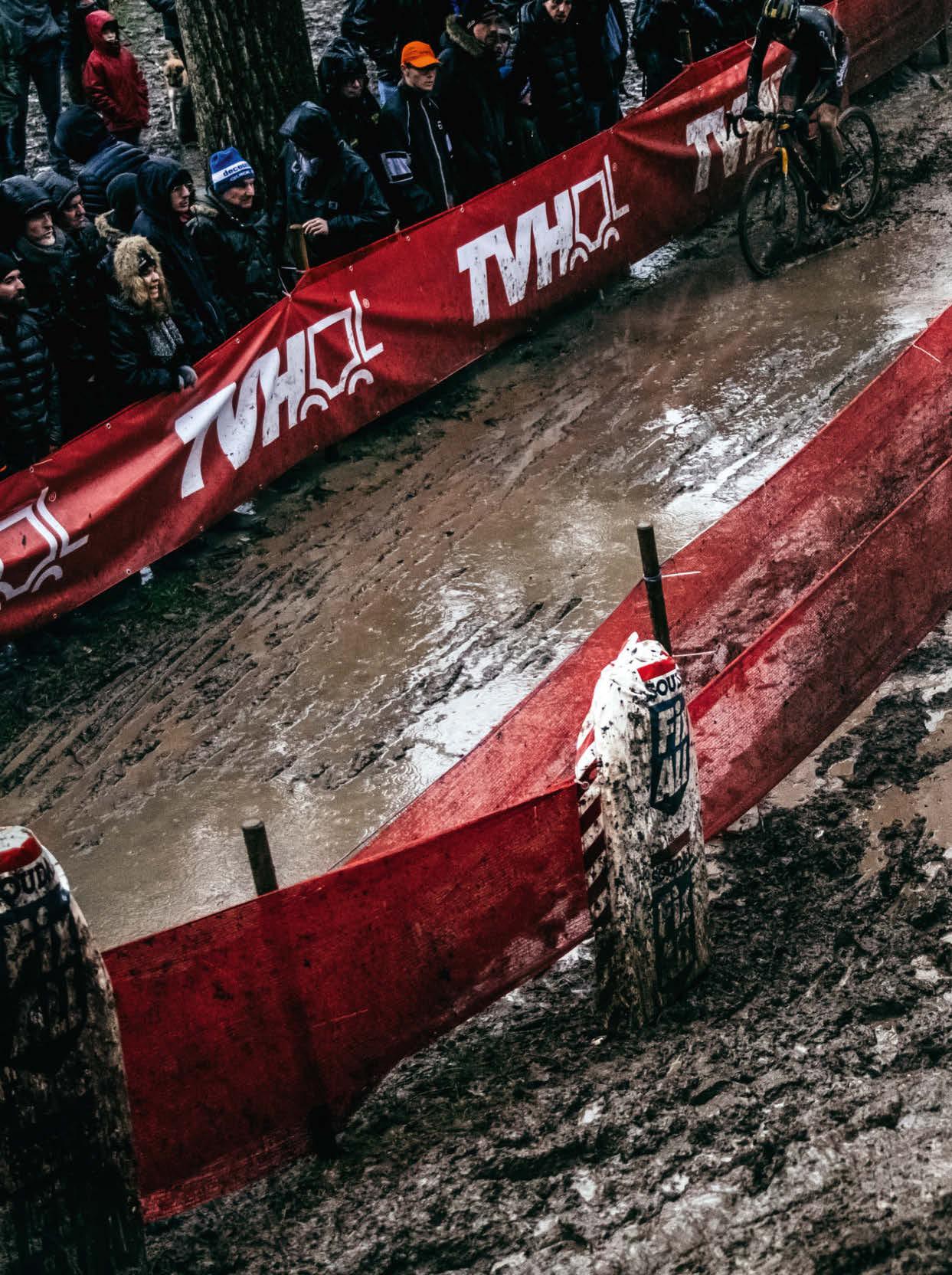
No slipping up: Pidcock negotiates the treacherously muddy course at the Cyclocross World Cup in Namur, Belgium, in December 2019, en route to a fourth-place finish
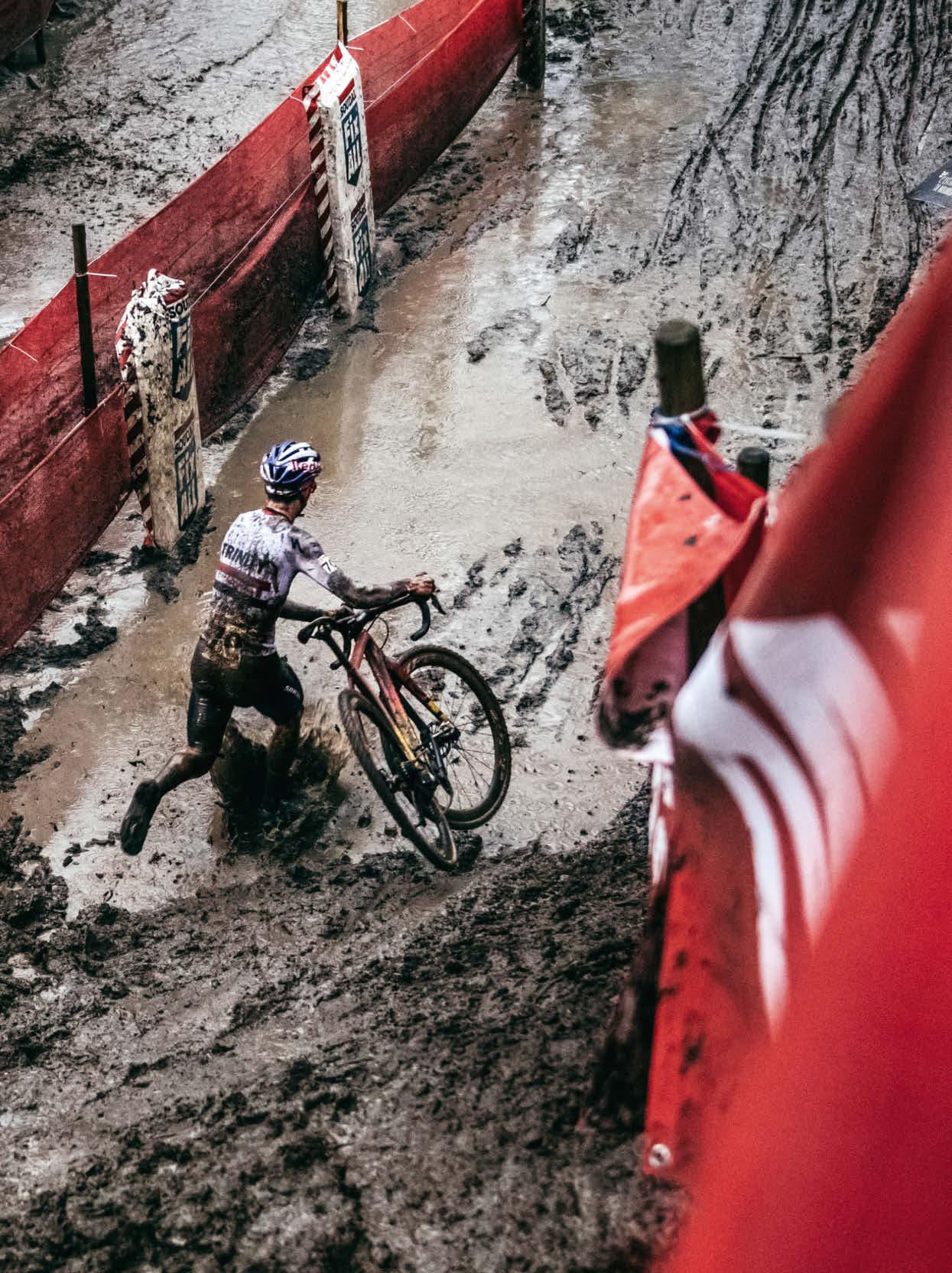
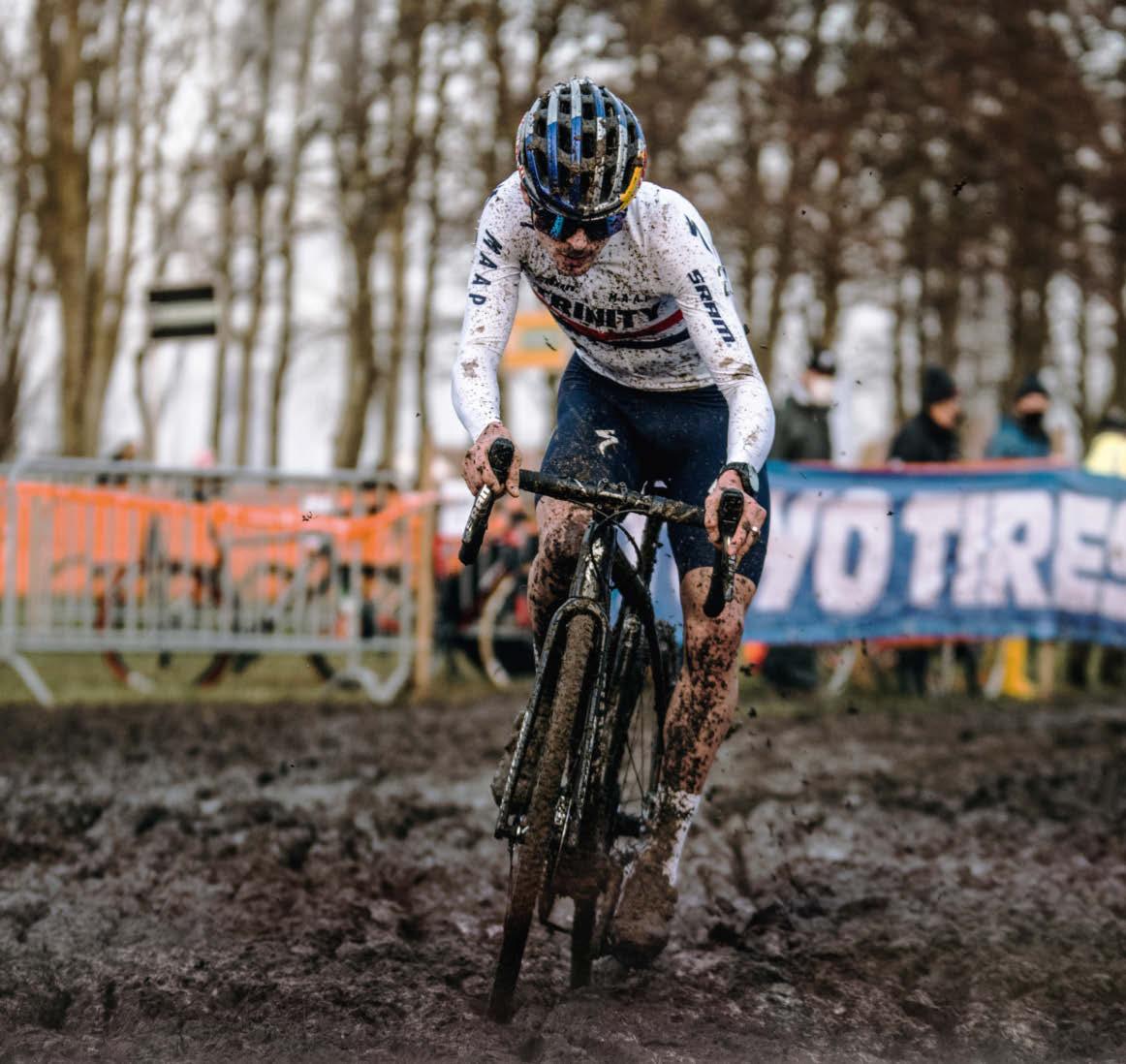
Games time
Could Pidcock add an Olympic medal to his collection?
Road racing’s pro tour is where cycling legends are forged: Bartali, Coppi, Fignon, Induráin, Merckx, Pantani, Thomas, Wiggins… the stellar cast reaches back more than a century. Some day soon, Tom Pidcock might be counted among their number. But then, he could achieve his breakthrough representing Team GB in cross-country (XC) mountain biking at the Olympic Games in Tokyo. Many stars will have to align for Pidcock to fulfil the qualification requirements of the British squad. Then there’s the awkward matter of when the already delayed Games will go ahead. On merit alone, Pidcock’s case for inclusion as a hot medal prospect is compelling, according to Stephen Park OBE, performance director of British Cycling. “Tom has been on our radar for a couple of years,” says Park, who cites his widely recognised cross-disciplinary abilities and, in particular, his exceptional bike-handling. “The skills he has learned in cyclocross and mountain biking allow him to maintain a higher average pace around a lap than his rivals.” Park relates how, at the 2020 XC World Championships, Pidcock won his under-23 class seemingly at ease while setting faster lap times than senior riders in the elite (non-agegrade) category. “Tom has a huge natural talent and a great love for the sport, so I have no doubt he’s part of the next golden generation of British riders. With his desire to be the best, he can definitely become a pin-up boy for cycling.”
Mud, sweat and gears: Pidcock at Hexia Cyclocross Gullegem in Belgium this January. After a battle with Van der Poel, he finished the race in second place
Notions of a ‘lightbulb moment’, when a future path suddenly became clear, are similarly dismissed. “I never thought, ‘This is what I’m going to do when I’m older,’” he says, “because I was already doing it. I was already a cyclist, living like a cyclist. So I never thought, ‘I want to be one,’ because I already was one, if you know what I mean.”
Destiny’s child? Maybe. But Pidcock is also making sure Destiny gets a firm shove on the cranks. Bogaerts enthuses about his focus and dedication – traits emphasised by fellow pro and likely British Olympian Evie Richards, who has frequently raced at the same meetings as Pidcock, and who trains with him whenever schedules permit. Richards tells how Pidcock’s festive period last year was spent in Belgium, away from his family, in order to commit to his training programme, whereas she preferred to “go home and have a great Christmas”. She believes this sheer desire to be one of his greatest assets: “He just loves winning and being the best. He wants it the baddest of everyone, and he’s always dreamed of success on a bike. That probably gives him fuel to the fire, and an extra drive that maybe not everyone has.”
Pidcock’s competitive hunger makes training with him a lesson in tough love, as Richards can attest from ego-bruising experience. “Tom is very… honest,” she confirms with a hint of nervous laughter. “If you’re going slow, he’ll say, ‘You’re absolutely shit today.’ And it’s not to be mean, because it brings you on. You’re only going to get better if people point out your weaknesses. And he’s very good at doing that.”
There’s no doubt that Pidcock brings impermeable self-assurance to his riding, though the taut line between supreme confidence and arrogance is the one on which elite athletes must teeter if they are to achieve their full potential. Should they falter, pro road cyclists are punished harder than most, for theirs is still a sport in the raw, whose protagonists risk frequent injury and even mortal danger.
Pidcock learned hard how road cycling can bite when he crashed in August 2019 on the Tour de l’Avenir – the self-styled ‘mini Tour de France’ for under-23 riders. Carving into a fast right-hand descent on a wet road in the final kilometre of stage six, he lost his bike and slammed into the tarmac, before skidding at speed into a barrier. He took a heavy blow to the face, which knocked him out, broke teeth, and scarred his nose, mouth and chin.
Pidcock later posted a bloody selfie to Instagram, accompanied by the message: “I don’t really remember much at the moment, but I remember enough to know what Instagram is and was also told I was going to win, which is a bit shit. Anyway I’ll live to fight another day.” He admits that since the accident he’s “not nearly as confident or as competent as before” on wet descents. But Bogearts cites the Pidcock steel that soon had him back in the saddle for a full winter of training: “Tom dealt with the injury and it gave him the mental strength to know he can overcome it. He was very professional.”
Evie Richards
Bogearts also doubts there has been any lasting dent to Pidcock’s abilities: “He’s still at a higher speed than is normal for the rest of the peloton. He can still stay near the front on descents. It’s just that, before, his speed was putting pressure on other riders. But Tom doesn’t need to rush this. He has the physical strength and talent to make it up in the climbs.”
The crash remains unexplained – “maybe it was a patch of oil” – and mystifying to Pidcock-watchers, as his bike-handling skills, honed off-road in cyclocross and mountain biking, are of the highest order. He’s as happy popping wheelies to celebrate stage wins as he is performing stoppies, hops and ‘Superman’ poses – arms out front, legs straight back, belly on saddle – just for kicks.
And, for Bogearts, Pidcock’s unbridled love of riding, and the enduring kid-like thrill he derives from being on a bike, may be a blessing beyond even his prodigious physical and technical gifts. “When you are working with a young rider,” says the Belgian, “you need to allow time for the body to develop, not to rush and maybe miss steps. Tom is still jumping on the bike every day like he is doing his hobby. Riding because he likes to be outside. Having fun.”
“He just loves being on two wheels,” echoes Richards. “I’ve tried to get him to stop for a break when we’re training in Girona, but he just wants to get back on the bike.”
It’s still too early to know what impact Pidcock will have on road racing’s pro tour, but the backwaters of life as a domestique (a team worker who supports the superstars) are surely not his fate. On his route to the pro tour, he has shown huge ability as a climber, a sprinter and as a time-triallist – each a key test for any rider with designs on victory. And while quite capable of winning from the front, Pidcock has also learned – on account of never being the biggest or strongest in the field – how to ride tactically, to flow with the race around him before striking for the lead, often late on when rivals have tired. Poised on the start line of his senior pro career, he appears to possess boundless potential, with few weaknesses.
“The reason I’ve stayed so long in the under-23s,” says Pidcock, “is to be in a position to win when I do move up. It dawned on me recently that the guys I’ve been looking at as my heroes are now my rivals, and I have to race them. But I want to be ready to win straight away.” Somehow that’s not in doubt. tompidcock.co.uk
SKATE ESCAPE

Last year, a world in lockdown went wild for the retro cool of roller skates, but, for some, life on eight wheels was already ingrained. These skaters are the latest generation of a longextant community in London pushing possibilities and fnding freedom against the odds
Sister kicks: Caitlyn Espenilla and Lenisha Benjamin – both of whom live alone so have created a bubble – in Asda car park in Colindale, London
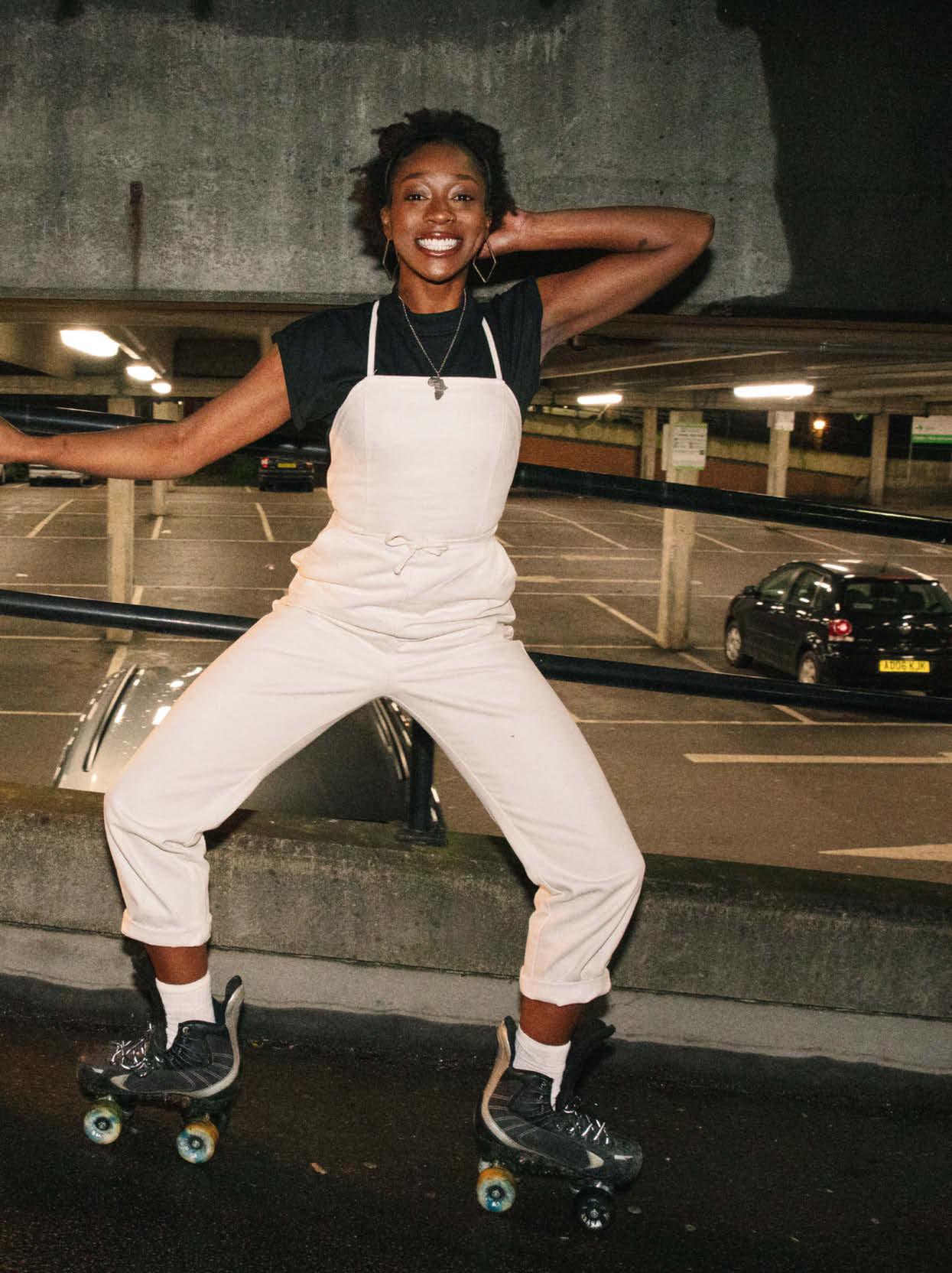
It’s an autumn morning, and at a supermarket in Tottenham, north London, early starters are walking through the covered ground-floor car park en route to work. Amir BacchusMarquis is just getting ready to head home to bed. Dressed in a black tracksuit, with loosely tied roller skates on his feet, he has been here since the night before. This cold, stark and dimly lit space has become a refuge for the 25-year-old, and for the roller-skaters who joined him here last night. They spent hours freestyling to beats from a Bluetooth speaker – soca, grime, R&B, bashment – and while they were pulling off spins, dips, slides, B-boy-style floor moves, complex footwork, and zooming around backwards at high speeds, they could forget about everything else going on in the world. Now, the sun’s up and, as the last stragglers finally leave, Bacchus-Marquis is making sure no rubbish is left behind. “I can’t tell you how many times I go to the car park at midnight to skate and when I look up it’s eight in the morning,” he says. “You’re in a sense of flow; time doesn’t matter.”
A passionate roller skater since he was a small boy, Bacchus-Marquis began practising moves in this car park on his own in 2019. When roller rinks were forced to close in 2020, he came to rely on this decent, dry, smooth patch of concrete, and eventually spread the word via his Instagram account, Skate Tingz. By early September, when he pulled this all-nighter at the local spot, other skaters would join him, soaking up the energy. When coronavirus restrictions were reintroduced and these meet-ups could mean a £10,000 fine, Bacchus-Marquis decided to lay low for a while and figure out what to do next. But nothing, he makes clear, was going to stop him from trying to keep this community alive.

Running tingz: Amir Bacchus-Marquis in Morrisons car park, Colindale. Opposite: Espenilla and Benjamin at Colindale Asda
